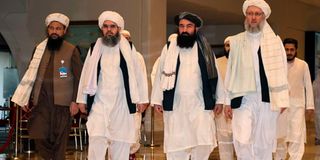What next for Qatar after Afghanistan's sudden fall?

A Taliban delegation walks down a hotel lobby during talks in Qatar's capital Doha on August 12, 2021.
Doha
The sudden fall of Afghanistan to the Taliban has thrust the group's presence in the Qatari capital into the spotlight.
But what now for the sometimes controversial outpost which Doha gambled would boost its own diplomatic credentials?
Why is there a Taliban office in Doha?
Located far from war-ravaged Afghanistan, Qatar nonetheless invited the Taliban to open a political office in Doha in 2013, with Washington's blessing as conflict in Afghanistan raged.
It was intended to be a base for Taliban negotiators, including accused militants, so the international community could engage the group politically.
The Qatar process got off to a rocky start, with controversy erupting soon after when the insurgents raised their flag above the high-walled villa.
Together with the Taliban branding of their mission as the office of the "Islamic Emirate of Afghanistan" — the name they used during their 1996-2001 rule — it provoked outrage in Kabul.
"The US increasingly pressured the Qataris to host some of the Taliban leaders that were released from Guantanamo," said regional analyst Andreas Krieg.
"The Taliban office then became more and more an integral part of the US strategy to negotiate a withdrawal from the country under the Trump administration."
Qatar maintained contact with the Taliban during its 1996-2001 rule but, unlike Saudi Arabia, the United Arab Emirates and Pakistan, never established diplomatic ties.
The Taliban nonetheless saw Qatar, which hosts the largest US airbase in the region, as a neutral host for talks.
Did the office contribute to diplomatic efforts?
While the situation in Afghanistan was ultimately decided on the battlefield rather than around the negotiating table, analysts said that providing a political space for the Taliban was an important role for Qatar.
"Qatar has been at the centre of this diplomatic engagement for a really long time, and that can only happen because there's been a decent engagement with all sides," said Royal United Services Institute research fellow Tobias Borck.
"Conversations were had; the deal the Trump administration made with the Taliban last year... required having this space."
Under the February 2020 deal, the US and its allies agreed to withdraw forces in return for Taliban security guarantees — as well as an insurgent commitment to negotiate with the now defunct government.
In Doha in the days after the Taliban seized control of Kabul, the Qatari capital's small community of Afghan emigres were disconsolate.
One man, who declined to be named for fear of retaliation, teared up while watching a Taliban official speaking on an Afghan news channel.
"They (the Taliban) say a lot of good positive messages until they control everything -- then they will start the crackdowns," he said.
What did Qatar get out of it?
Qatar was riding high when the Taliban and US signed their deal in February.
But critics have questioned why the Intra-Afghan Dialogue, a key proviso of the withdrawal deal, was erratic and faltering.
There will also be some who question whether Qatar could have done more to broker some sort of deal to avert a Taliban takeover.
"Partly due to Qatar's own capacity issues, they don't understand Afghanistan," said Michael Stephens, a senior fellow at the Foreign Policy Research Institute.
"(But) it was exactly what they wanted to be -- the centre of intercultural diplomacy.
"It was the image they were trying to cultivate."
What does the future hold?
Now the head of the Taliban's political office and deputy leader, Mullah Abdul Ghani Baradar, has returned to Afghanistan, aboard a Qatari air force plane, and it is unclear what role the Gulf outpost will play.
Several group members remain in Qatar, as does the former Afghan government negotiating team, who number around 20. They now face an uncertain future in Qatar.
"If the US rallies support to not recognise the Taliban government it will be hard for Qatar to" recognise the Taliban, said Krieg, suggesting the office would be unlikely to transform into a full embassy under those conditions.
"Qatar is likely going to follow the US lead on this while not jeopardising its standing as a mediator in this conflict," he said.
Borck said he was "sure Qatar will remain at the centre of the conversations that happen -- there isn't any viable alternative."





